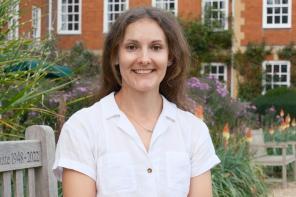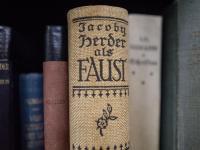
About
Contact details
Biography
I first came to LMH to read Spanish and French as an undergraduate, where the brilliant teaching and support I received from my tutors, Professor Marie-Chantal Killeen and Professor Xon de Ros, gave me the enthusiasm and confidence to pursue further study. During my BA and subsequent MSt, they inspired the interest in women’s life writing that became my specialism.
I moved to Wolfson College for my DPhil in twenty-first-century Spanish and French life-writing (2020), which was supervised by Professor Marie-Chantal Killeen and Dr Daniela Omlor. Thanks in no small part to the exceptional guidance and encouragement of my supervisors, I went on to hold stipendiary and departmental lecturer posts in Spanish at Oxford, before taking up my first permanent post at University College Dublin in 2022. After a wonderful eighteen months in Dublin, I was delighted to have the opportunity to return to LMH as Tutor and Fellow in Spanish, where I hope to help inspire students as my own tutors and the wider College inspired me.
Research Interests
My research focuses primarily on women’s autobiographical practices in the twentieth- and twenty-first century. I am particularly interested in comparative approaches, whether it be considering works across languages and cultures or across media.
In my first monograph, I analysed intergenerational responses to traumatic loss in twenty-first-century Spanish and French women’s writing, two literatures whose influence to date on the field of life writing has differed considerably. I explored the questions that this dialogue between approaches raised for longstanding assumptions in autobiography studies and existing accounts of ethics in trauma theory.
My current project builds on these findings to respond to the lack of attention that has been afforded to autobiographical works by Spanish women in international discussions of life writing. Surveying diverse forms of self-representation, from grief memoirs to autofictional film, in dialogue with the socio-historical circumstances that have played a major role in shaping the practice, it traces key tendencies that have emerged from the 1940s to the present and explores the insights this body of work offers in the context of twenty-first-century theoretical discussions.
Teaching
I teach the full Prelims course for students in Spanish at LMH and Somerville College and convene Introduction to Spanish Film (XI) for students of Spanish Sole. For FHS, I teach peninsular options in literature and film for the modern period paper (VIII) and special authors including Ramón del Valle-Inclán, Federico García Lorca, and Benito Pérez Galdós for Paper XI. I co-teach options for Paper XII in women’s writing and life-writing and supervise extended essays (XIV) and master’s theses on twentieth- and twenty-first-century women’s writing and life writing.
I welcome expressions of interest from prospective PhD candidates working on modern peninsular life-writing, women’s writing, and comparative projects on twentieth- and twenty-first-century Spanish literature and film.
Outreach
As a former first-generation student from a non-selective state school, access and outreach initiatives are close to my heart. I am Schools Liaison representative for the Spanish Sub-Faculty and I am especially keen to receive applications from students from schools who do not have a history of sending students to Oxbridge.
Selected Publications
Relational Responses to Trauma in Twenty-First-Century French and Spanish Women’s Writing (Oxford: Oxford University Press, 2024)
The Autofictional: Approaches, Affordances, Forms, ed. by Alexandra Effe and Hannie Lawlor (Cham: Palgrave Macmillan, 2022)
Effe, Alexandra and Lawlor, Hannie, ‘Rethinking Autofiction as a Global Practice: Trajectories of Anglophone Criticism from 2000 to 2020’, a/b Auto/biography Studies (2024), 1–33
‘Conflicting Relations in Christine Angot’s Un amour impossible [‘An Impossible Love’]’, Journal of Romance Studies, 22.3 (2022), 311–30
Forthcoming
‘Resisting Imposed Identities in Postwar Fictions of the Self: Carmen Laforet’s Nada (1945) and Rosa Chacel’s Memorias de Leticia Valle (1945)’, in Del franquismo a la democracia: género y autoridad en las auto/representaciones de las escritoras españolas de posguerra, ed. by Raquel Fernández Menéndez and Aina Pérez Fontdevila (forthcoming 2024 in Hispanic Research Journal)
'Post-Traumatic Transitions: Writing Women’s Lives in Dulce Chacón’s La voz dormida [The Sleeping Voice]’, in Feminine Plural: Women in Transition in the Luso-Hispanic World, ed. by María-José Blanco and Claire Williams (forthcoming 2024 with Peter Lang)
‘Montage and Narrative Mode: Hybrid Stories and Storytelling by Contemporary Women Writers’, in Montage in Spanish and Portuguese Literature, ed. by Daniela Omlor and Luisa Coelho (forthcoming 2025 in Bulletin of Contemporary Hispanic Studies)
‘Agnostic Memory and Impossible Conversations in Life Writing’, in Memory Studies in Spain and Portugal: A Handbook, ed. by Alison Ribeiro de Menezes and Ellen W. Sapega (forthcoming with Brill)
